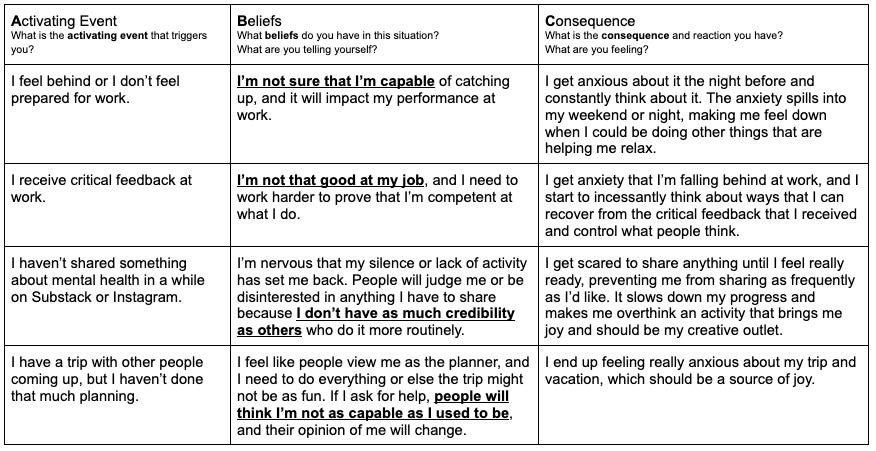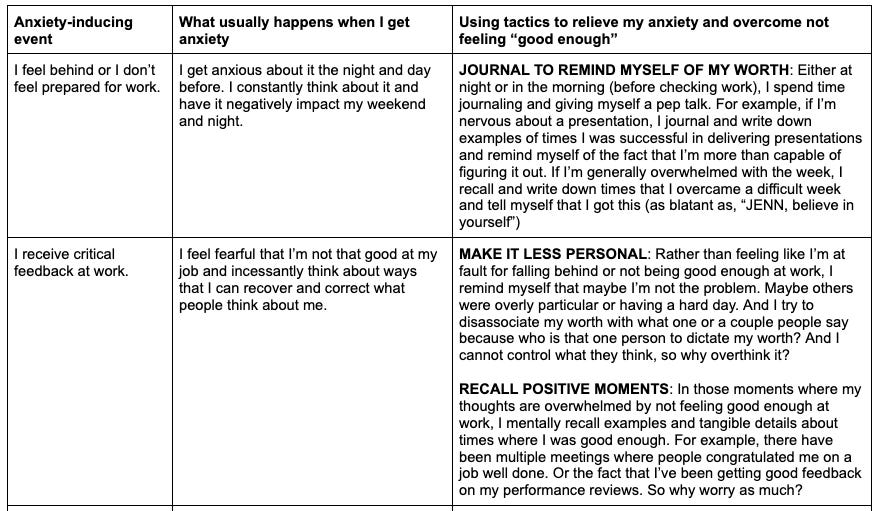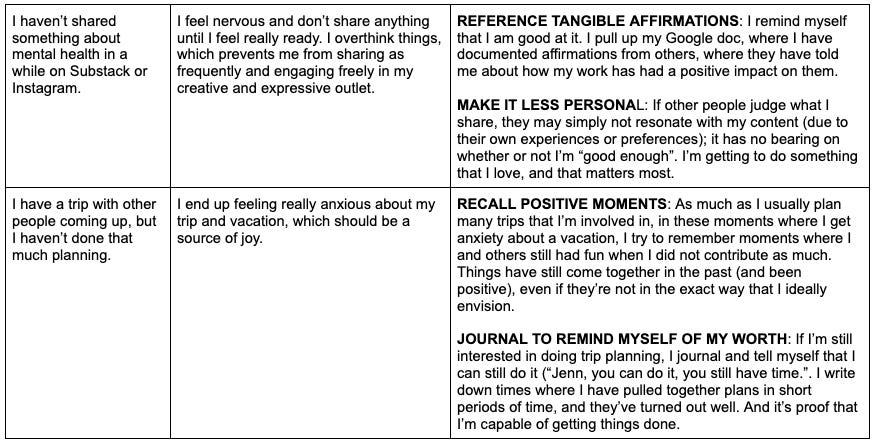Overcoming the feeling of “I’m not good enough”
“We’re often our own worst critic.” Yeah, it’s true. Now stop it and do something about it (easier said than done, I know). Sharing my daily struggle with anxiety and how I save my own day
Last year, I wrote a lot about overcoming anxiety. Relatively, my anxiety is a lot less than before. But truth is, I still have a lot of it; it’s just a lot more manageable now than before because I have proven strategies and tactics (from therapy and my own investment in self-improvement) that help me overcome and confront them faster.
Today, I’m sharing my daily experience with anxiety to normalize our daily struggles and get people to acknowledge and recognize the difficulties of what they’re going through. Most importantly, I’ll share some tactics that help me on a daily and weekly basis navigate my own anxiety, especially around not feeling “good enough”, in the hopes that they resonate with anyone else that struggles with similar feelings. And the best part of it all is that the tactics all rely on myself and my actions. So that I don't need to sit around and rely on anyone else to make me feel better, when I really need it.
So what does my anxiety look like on a weekly basis?
Physically, I still get regular, physical manifestations of my anxiety through elevated breathing and biting my nails. Mentally, negative and worrisome thoughts will occasionally swirl in my mind, making it hard to think about anything else or be as productive as I’d like to be.
And what triggers that anxiety?
Below are some examples from daily life that trigger me. Using the A-B-C framework that I’ve talked about in my previous posts, I’m also showing you the beliefs that I have in the moment, which ultimately cause my anxiety and negatively impact my reactions (see “Consequence” column).
As you can see, looking at a lot of these examples, a huge underlying belief of my anxiety continues to be thinking that I’m not good enough in general and compared to others.
Why do I feel that I’m not good enough? (Understanding my anxiety through deep reflection and therapy)
Not being “good enough” is a pretty common belief that many people hold. It could be gendered, generational, personal (from past experiences) or reinforced by society and its beliefs about what it means to be “good enough” and have your shit together.
From my experience actively trying to overcome anxiety, I’ve found that the most effective strategy is to confront things head on (more in this past post). It’s uncomfortable but so worth it. Through therapy and self-reflection, I’ve gathered that my upbringing had a lot to do with my belief of not being “good enough”. My parents were very loving but they consistently promoted the pursuit of academic excellence and high achievement when I was growing up. Because of that, I may have internalized a lot of their preferences for high-achievement with my own worth. I put a lot of stress on myself to do well in school, obtain a high-paying job, and be high-achieving in anything I pursued because I had the perception that me being anything else wouldn’t be “good enough”. For them. Or for anyone else.
Understanding one of the biggest roots of my anxiety allowed me to challenge or take action to debunk some of the deep, irrational thoughts and fears that were subconsciously running through my mind (more in this post).
Simpler tactics to overcome not feeling “good enough” that I employ on a daily and weekly basis
I’m aware that identifying the source of deep anxiety takes a lot of introspection, humility, and time. So in parallel, I want to share some of my quicker tactics to overcome the feeling of “I’m not good enough” that can go alongside the soul-searching and deeper introspection above.
A couple years ago, I happened upon a book called, “Choose your story, Change your life”, written by Kindra Hall. I didn’t get through the whole thing, but I got through enough to completely agree with the author that your quality of life is deeply connected with the stories you choose to tell yourself. And if you could change those stories that you (consciously and subconsciously) tell yourself, your life can forever change for the better.
So here are some tactics that relate to changing the stories you tell yourself about “not being good enough” and choosing better ones:
1. Make it less personal, so that you NOT being “good enough” is not always the issue.
What does this entail? Reframe your beliefs of “I’m not good enough” to something like “other people are just really picky or hard to please”. This one was a game changer when I experienced work burnout. Sometimes, a clear reframe is the perspective we really need. In the past, my poor relationship with my manager and negative experiences at work were major topics in my therapy sessions, which made me feel like I wasn’t good enough on the daily. With a simple reframe from my therapist, she suggested, “Rather than you not being ‘good enough’, it could be that the manager and people you work with are really hard to please.” That was such a better way of looking at it, especially because I knew many other people felt similarly to me.
2. Document (external) affirmations or stories from others about the times you were good enough (or more than good enough), so that you can reference tangible positive affirmations when you’re feeling down.
What does this entail? Think back on all the times that someone said something kind to you about something you did. That made you feel good, like you were enough or more than enough. Now write or type them down (I personally type my external affirmations in a Google doc) so you have something tangible to refer to when you’re feeling down and not good enough. You’ll be pleasantly surprised at the reinforcement in your own worth that happens when reading those affirmations.
3. Fully celebrate and take in the moments when you feel “good enough” so that you can easily recall those positive moments when you feel insecure.
What does this entail? Many people have a negativity bias, where we tend to remember vivid details about a negative event over those of a positive event. Given that common negativity bias (which I certainly have), I think it’s important to overanchor and remember all the details about positive moments. When you’re in those moments, truly work on celebrating yourself. Treat yourself to something or even just tell someone else how proud you are of yourself. Soak it in, and try to remember all the details about it (where you were, what you felt, who was with you, what you were wearing, etc.) By remembering those details vividly (mentally or in written form), you can draw on these positive memories when you’re feeling insecure.
4. Employ positive self-talk and journaling to pick yourself up when you’re feeling insecure and remind yourself of your worth and capabilities.
What does this entail? A lot of the time, we search for external affirmations about our worth when we’re feeling insecure. But I’ve found that an essential key to managing your own anxiety is being able to affirm yourself and have self-love and appreciation from within in those moments. Tactically, I’d recommend speaking out loud to yourself or journaling (“You can do it, you’ve done this before”) so that you can viscerally feel your own positive self-talk. This tactic is often related to point #3 (recalling positive moments where you felt “good enough” and can reinforce your own self-worth).
Putting these tactics into action
To better illustrate the tactics, I’m bringing back the real-life examples of the anxiety-inducing events that I experience on a daily basis and sharing how I employ the tactics (third column) to relieve some of my anxiety in those moments.
After employing these tactics, I’ve found that my physical and mental manifestations of anxiety slowly start to simmer down. My breathing isn’t as elevated, the negative thoughts in my head gradually start to fade into the background, and ultimately, I feel a sense of relief in choosing better stories in those anxiety-inducing moments.
In conclusion, if you struggle with not feeling “good enough” like I do, try practicing these 4 tactics and see if they help. They’ve definitely helped me; I legitimately use these four tactics on a daily basis. My anxiety is not gone, but I can usually keep myself at bay and in check. Without always having my day be ruined or needing a therapy session (though I still do those regularly because they often yield additional perspective to add to my arsenal of anxiety management). I don’t need to depend on reassurance from someone else (though this also can help a lot); I can be my own savior in these tough moments.
I appreciate your time as always, and I’m open to hearing if these or anything else has worked for you in managing anxiety around not feeling “good enough”!







Hi Jenn, as a new subscriber, thank you for sharing these tactics and ways to overcome anxiety. This really resonated with me and I plan on sharing with my older son as well. I look forward to reading more substacks from you!